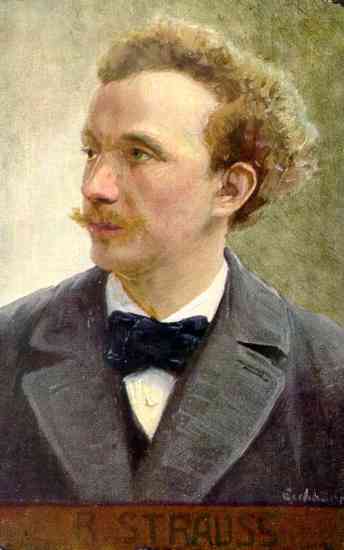 |
| Seriously. Most iconic film opening. Ever. |
Also Sprach Zarathustra was composed in 1896 by Richard Strauss, son of Franz Strauss, a horn player who - despite his own distaste for Richard Wagner - played in several of the latter's most famous opera premieres, including Das Rheingold and Die Walküre. Interestingly enough, Richard was not related to that other great Strauss of waltz fame, Johann, a composer whose works you most certainly know. (Don't believe me? Try this one out: http://www.youtube.com/watch?v=VTqlLKBKFhg )
 |
| Richard Strauss, proofreadin' my text. |
A tone poem, or symphonic poem, is a single-movement work of music that is based off a preexisting work of art, theatre, or poetry. Instead of form, the focus is on evoking a feeling or image in the audience members' heads. The symphonic poem emerged in the first half of the 19th century partially due to the Romantic desire to express deep emotional ideas free from constraint of form, and partially due to the nagging thought that no one could ever top Beethoven's 9th symphony in terms of evoking the sublime. There are some today who would agree with the latter statement. The symphonic poem saw a sharp decline in popularity in the 1920s, which is (not coincidentally at all) right around the time that film became an affordable form of entertainment for the masses. As the symphonic poem was essentially a film score without the film, once film came into its own, the music had no need to stand alone anymore - though in recent years, there has been a bit of a trend in the opposite direction, with the most notable example being the "Lord of the Rings Symphony," a concert piece derived from the film score of the same name.
Also Sprach Zarathustra was not derived from a poem, play or painting, but rather from a treatise by Friedrich Nietzsche of the same name. Translated into "Thus Spake (or Spoke) Zarathustra," the book contains many of Nietzsche's central teachings, such as the idea that God is dead and the hypothesis that human beings are a transitory step between animals and Übermenschen, or over-humans. Roughly thirty minutes long, Strauss' symphonic poem is divided into nine sections, each titled after a chapter in Nietzsche's treatise. The Einleitung, or introduction, is the section used by Kubrick to such effect in 2001: A Space Odyssey. One of the reasons the marriage of image and sound in this opening is so effective lies in Strauss' subtitle for this section, found in his program notes; "Sunrise." Indeed, there may never be a better aural depiction of a sunrise ever composed.
 |
| This is what triumph looks like, 29th-century style. |
Further Listening:
Like Richard Strauss? Try "Beim Schlafengehen," from Vier Letzte Lieder (Four Last Songs, 1948): http://www.youtube.com/watch?v=PhdN1x4ke74
Like symphonic poems by Strauss? Try Till Eulenspiegels Lustige Streiche (Till Eulenspiegel's Merry Pranks, 1895): http://www.youtube.com/watch?v=BCGNVK9pudI
Like the '70s? Try Deodato's Also Sprach Zarathustra:
http://www.youtube.com/watch?v=t5Rn7S2zLWE
Isn't there another name for Till Eulenspiegels Lustige Streiche?
ReplyDelete